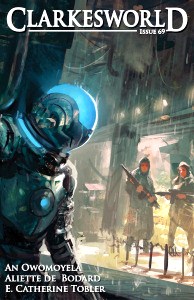 Clarkesworld #69, June 2012
Clarkesworld #69, June 2012 “Immersion” by Aliette de Bodard
“If The Mountain Comes” by An Owomoyela
Reviewed by Sherry Decker
Aliette de Bodard crafted “Immersion” and it’s lovely. The loveliness tends to dominate the first half of the story but you’ll be rewarded if you persevere.
Quy observes tourists (Galactics) disembarking at the Longevity spaceport. She has watched this activity many times and compares the throng of visitors to “a plague of centipedes or leeches.”
Like most Rongs on Longevity, Quy is not as she appears: “…stretched eyes that crinkle in the shape of moths, the darker skin, the smaller, squatter shape more reminiscent of jackfruits than swaying fronds. But no matter: you can be made perfect; you can put on the immerser and become someone else, someone pale-skinned and tall and beautiful.”
Quy is disappointed, but not because of how she looks when not wearing her immerser. She has recently returned from Prime having failed her exams. Now she helps in the family restaurant and admires her younger sister, Tam. Tam has a talent for dismantling technical equipment to learn how it operates. Tam has tried to take apart immersers before, the equipment that creates the avatars they wear for business, but the first time she attempted this she injured her hands. Immersers are designed with built-in safeguards.
The story fluctuates between Quy and an older woman, called Agnes. Quy’s part of the story is told in past tense, the woman’s in present tense. It’s the woman’s sudden, short, and desperate bursts of introspection that are the most interesting. She struggles to remember common words. She strains to remember her own name, and that of her husband’s. Agnes. Galen. She is relieved when she remembers. She prefers nostalgia; flashes from her childhood, glimpses of herself when she was young.
The woman is a Rong, the same race as Quy, but the woman’s avatar is so dense it takes someone like Quy, someone sensitive and observant, to detect what hides beneath.
The woman has become addicted to her immerser. It is affecting her brain and her ability to comprehend daily life, her communication and comprehension, even simple things.
Quy and the woman have more in common than either suspect when they first meet. Quy uses her immerser because it’s expected, the woman because she no longer has a choice.
This is not a story about another world, or about spaceports or tourists traveling off world. It’s not even about a device that creates an avatar, a facade disguising a less-than-perfect countenance beneath. It’s about people who feel pressured to fit in, pressured to look a certain way, to fit a mold they do not fit and never will, a sad story with a positive ending. Not necessarily a happy ending, but satisfying and convincing. Well done.
“If the Mountain Comes” by An Owomoyela has an intriguing beginning, using plain yet engaging words. The words draw you in and don’t let go.
Imagine a village desperate for water. The river is powder dry, hard clay, and Mr. Wolfe owns the only wells that provide water for the entire village. The water has made him a wealthy man. His daughter is caught between her father and the villagers who hate him.
A stranger arrives, promising he’ll bring the river back, and that he’ll teach the people how to refill the aquifer. He knows how to manage water so that it never dries up again. Now the villagers have hope and their hatred for Mr. Wolfe increases.
Mr. Wolfe readies for war. He pays his soldiers well and has a pack of mean dogs to help in the fight. He and his men prepare for a bloody battle by sharpening their machetes.
The daughter fears her father and fears the villagers. She imagines the stranger’s words, about the river overflowing its banks and how hyacinths will grow again. She has never seen hyacinths.
This story is about greed, fear and faith, those things that always seem to start wars. There is no clear ending to the story, but I was left with a positive feeling and enjoyed the tale.
“You Were She Who Abode” by E. Catherine Tobler is a touching, harsh tale of war, so don’t read this if you cry easily, especially if the thought of toddlers used as lures to draw a sympathetic enemy closer makes you shudder. A soldier-mother cannot resist attempting to rescue a child caught in the middle of a war zone.
This is written with sometimes choppy verse, the way memories flash before your eyes. Visions. Feelings. They’re temporary weaknesses. You can’t dwell in the past for long with things exploding around you. Abandoned hardware stores have nails and nails penetrate like arrows. Hiding under a shelf doesn’t protect you or the child in your arms. Shelves fall. You hear a distant voice. “Mama.” Cardee Findar worries about her daughter, Lottie, back home.
Not a story for you if you insist on a beginning, middle, and end. It’s scenes, some horrific. Past, present, past, present, back and forth. Cardee can’t remember where she is or how she got there: “Cardee blinks, the room around her unfamiliar. She wanders, touching walls that should be made of ash. Why is there a ceiling and how can there be windows without cracks? Just when it seems the walls might crumble to ruin under her fingers, there’s another hand, this one drawing her own from the wall. Cardee whimpers because part of her wants to see these walls fall down. It’s what she knows, jagged lines against smoky sky.. . . rain like nails, and she lifts a hand to feel the line of her skull, whole now but still shorn, wrapped under a bright cloth.”
Cardee can’t remember where she left her rifle.